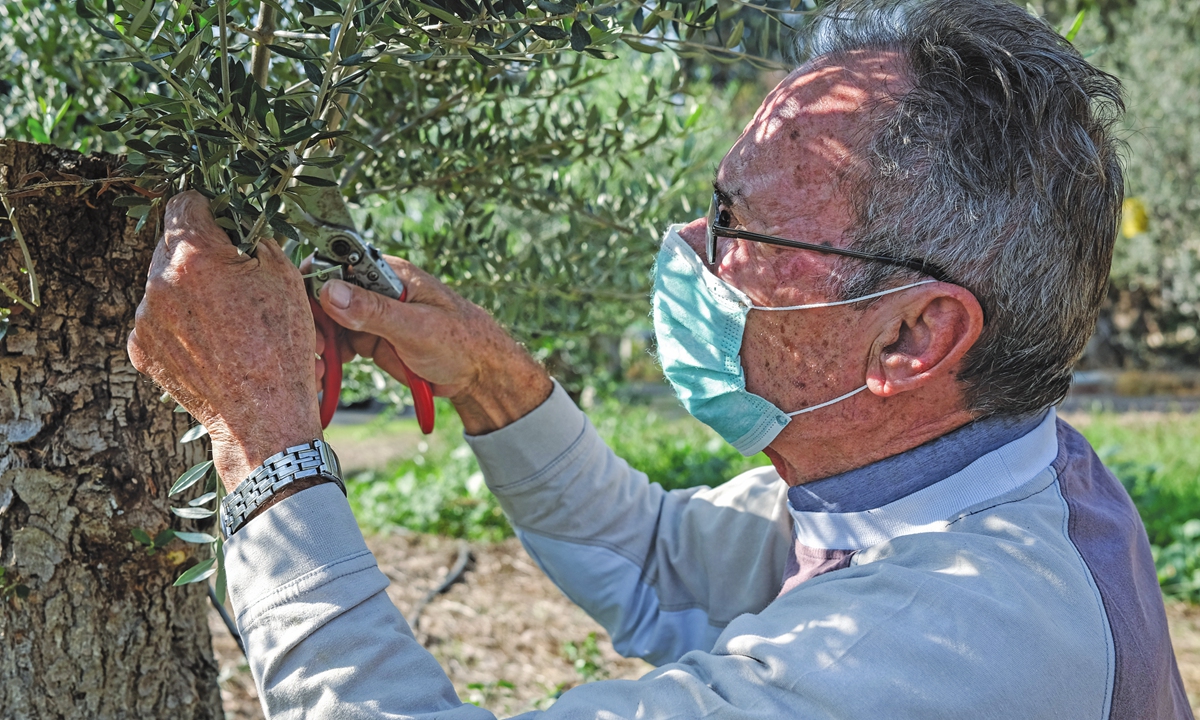Cyprus olive farmer deals with climate challenge
Source: AFP Published: 2020/11/29 18:03:40
Standing in her olive grove in Cyprus, Elena Sampson sighs at the sight of hundreds of barren trees and vows to tackle climate change after another scorching year.

The first of several heat waves in 2020 descended in May, the flowering season for her 2,500 olive and citrus trees. "This year the heat wave struck at the exact time that the olive trees were flowering, and it was not just a heat wave of a couple of days," said the 38-year-old Greek Cypriot.
"We were watering, watering, but we didn't manage to save the blossoms," Sampson said.
Harvested for millennia on Cyprus, olives are at the heart of the island's culture and trees now cover 11,000 hectares of its land, according to the UN's Food and Agriculture Organization.
More than 19,000 tons of olive oil were produced in 2018. But olive oil and other sectors of Cypriot agriculture face the threat of climate change, Adriana Bruggeman, an associate professor at the Cyprus Institute, told AFP.
"Not only droughts, but also increasing temperatures and heat waves affect the flowering, fruit set and ripening of crops," she said.
Olive trees are generally resistant to drought, but need water during the flowering season in the spring. But Bruggeman warned that some semi-arid areas of Cyprus now face the threat of becoming fully arid by 2050 because of global warming.
Official figures show average annual rainfall has fallen to 470 millimeters since 1971. Heat waves are more common and have shortened springtime.
In 2020 alone, the mercury soared above 42 C on May 17 and the island experienced its highest ever recorded average daily temperatures for July, August and September.
Change is 'doable'
"We know that climate change will make the region hotter and drier... We need to adapt to this change and make our agricultural and semi-natural ecosystems more resilient," said Bruggeman.
"If you have healthy soil, you have less runoff, less erosion, more water retention, which means we can try to fight droughts," said Sampson.
A 2016 study based on a worst case scenario warned that 43 percent of Cyprus' territory is in "critical" danger of desertification.
Sampson largely avoids tilling her land - a practice that leads to soil erosion and carbon loss.
"I think it's doable to make that change, I want to be part of that change," she said.
Newspaper headline: Planting progress

A caretaker at an olive grove prunes the branches of an olive tree, in the village of Akaki in central Cyprus on November 12. Photo: AFP
The first of several heat waves in 2020 descended in May, the flowering season for her 2,500 olive and citrus trees. "This year the heat wave struck at the exact time that the olive trees were flowering, and it was not just a heat wave of a couple of days," said the 38-year-old Greek Cypriot.
"We were watering, watering, but we didn't manage to save the blossoms," Sampson said.
Harvested for millennia on Cyprus, olives are at the heart of the island's culture and trees now cover 11,000 hectares of its land, according to the UN's Food and Agriculture Organization.
More than 19,000 tons of olive oil were produced in 2018. But olive oil and other sectors of Cypriot agriculture face the threat of climate change, Adriana Bruggeman, an associate professor at the Cyprus Institute, told AFP.
"Not only droughts, but also increasing temperatures and heat waves affect the flowering, fruit set and ripening of crops," she said.
Olive trees are generally resistant to drought, but need water during the flowering season in the spring. But Bruggeman warned that some semi-arid areas of Cyprus now face the threat of becoming fully arid by 2050 because of global warming.
Official figures show average annual rainfall has fallen to 470 millimeters since 1971. Heat waves are more common and have shortened springtime.
In 2020 alone, the mercury soared above 42 C on May 17 and the island experienced its highest ever recorded average daily temperatures for July, August and September.
Change is 'doable'
"We know that climate change will make the region hotter and drier... We need to adapt to this change and make our agricultural and semi-natural ecosystems more resilient," said Bruggeman.
"If you have healthy soil, you have less runoff, less erosion, more water retention, which means we can try to fight droughts," said Sampson.
A 2016 study based on a worst case scenario warned that 43 percent of Cyprus' territory is in "critical" danger of desertification.
Sampson largely avoids tilling her land - a practice that leads to soil erosion and carbon loss.
"I think it's doable to make that change, I want to be part of that change," she said.
Newspaper headline: Planting progress
Posted in: ASIA-PACIFIC